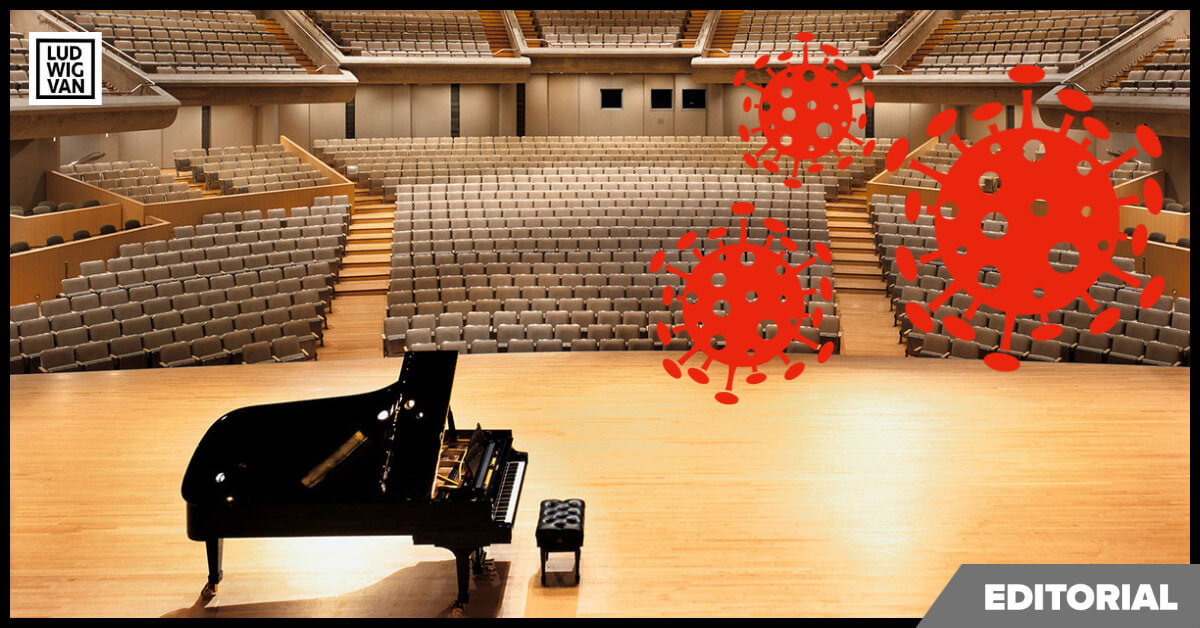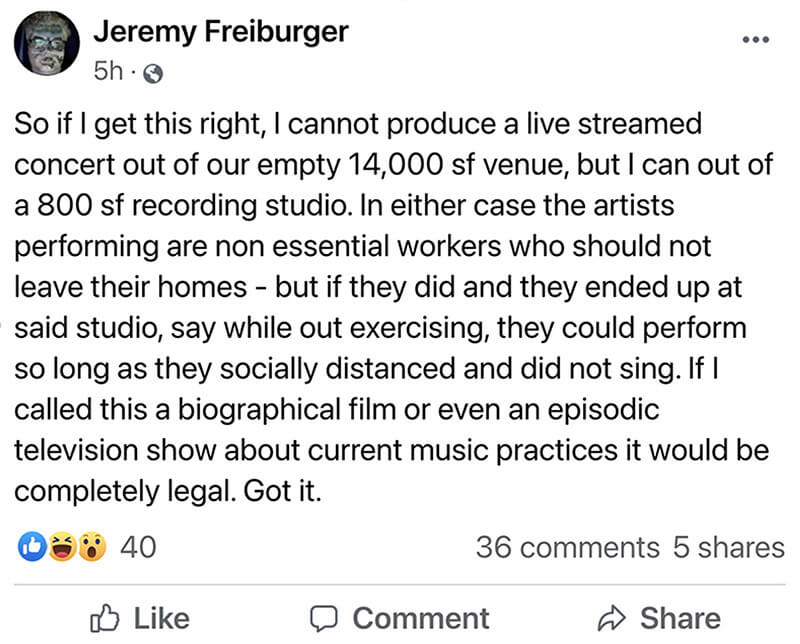
Notwithstanding a new year, it feels more like December something than January something.
Over the past ten months, we have watched the pandemic continually hammer the performing arts, resulting in the cancelling of thousands of in-person events across the country. Without skipping a beat, Canada’s major venues such as the National Arts Centre and Toronto’s Koerner Hall were among the first to innovate with pivots to livestreaming technology and drive-in events.
These pivots offered hope for an industry intent on finding a way to provide live music, dance, comedy, and theatre to patrons watching safely from their homes or vehicles.
That hope came screeching to a halt on January 12, when the Ontario provincial government announced revised lockdown legislation that temporarily forbids filming and music rehearsals at concert venues across Ontario until at least February 11, 2021. Inexplicably, Drive-in and drive-through events were also suspended.
Some in the industry were quick to suggest that the amended legislation amounted to a double standard, as the film and recording industry was exempted entirely.

Making matters worse was that venues struggled to decipher the vague wording used in the legislation, significantly as the rules regarding the lockdown had just been revised on December 21 — including language to ensure livestreaming can continue as long as there is no audience. Even Toronto’s Mayor John Tory was looking for answers.
Considering that one of the benefits of livestreaming is that it helps keep people home, the rationale for an outright ban is hard to justify — not to mention the positive contributions live stream events make for people who need the arts now, more than ever.
We’re All In This Together?
The pandemic’s full economic impact won’t be known for some time, but initial reports show the financial losses to the performing arts have been unprecedented.
Before the pandemic, StatsCan data showed that the culture industry contributed $58.9 billion, or $1,611 per capita, representing 2.8% of GDP. Live performance accounted for $2.8 billion of that. Amid the pandemic, conservative estimates suggest a revenue decline of 60 to 90 percent and an estimated $1.7–2.5 billion loss.
A recent survey from I Lost My Gig Canada (via Hill Strategies) revealed an enormous economic impact on performing artists and culture workers. The survey showed workers had lost a staggering 83 percent of their annual income, which at $30,500, was already near the poverty line. The average gigs lost per artist was between 34 and 37. Income lost per artist was estimated at $28,400 in Alberta and $21,100 in the Atlantic provinces.
The impact in the U.S. has been equally alarming. The Brookings Institute reported the arts sector had lost an estimated $150 billion in revenue for a total decline of 29 percent. The worst-hit was the performing arts, which has lost $42.5 billion and an estimated 1.4 million jobs, representing 50 percent of its entire workforce.
Avoiding The “L” Shape Recovery
While forecasters have been busy arguing whether the economy will undergo a W, K or V-shaped recovery, the events sector has been stuck in the starting gates.
According to a survey released last week from the Canadian Federation of Independent Business (CFIB), over 181,000 businesses across Canada (one in six) are considering shutting down as a direct result of the pandemic. Since March, approximately 58,000 have closed permanently. The CFIB forecasts a grim 20 percent of private-sector jobs will be lost over the next 12 months.
“We are not headed in the right direction, and each week that passes without improvement on the business front pushes more owners to make that final decision,” said CFIB senior director of national research, Simon Gaudreault. “The more businesses that disappear, the more jobs we will lose, and the harder it will be for the economy to recover.”
What does this mean for venues? The CFIB report found the hospitality and arts sectors have been the most impacted sectors in the country. The projection is between 28 and 33 percent of arts organisations, including venues, will shut their doors permanently over the next 12 months.
In May, the Canadian government announced $500 million in emergency funding for qualifying cultural, heritage and sports organisations. The grant helped cover the sudden drop in revenues, but the longer they remain in a holding pattern, the longer the recovery.
The main concern is the severe hit to capital reserves resulting in degrowth and the potential for a significant decline of patrons due to their moving to new forms of entertainment during the pandemic. The result may be an initial rising leg with a low upward slope that quickly flattens out, resulting in a much-dreaded L-shape trajectory.
This is all happening while others, particularly big-tech, enjoy one of the biggest booms in a decade. The stocks for top-performing tech companies (Amazon, Facebook, Google, Apple, and Microsoft) are at all-time highs. Tesla’s Elon Musk is currently in a race with Amazon’s Jeff Bezos to become the world’s first Trillionaire. Starting with $24.6 billion pre-COVID, Musk’s net worth has grown by more than $150 billion since March 2020. Bezos’ fortune has also continued to grow, though not as fast: He’s up to $182.8 billion from $113 billion over the same period.
What this suggests is that recovery is asymmetrical and highly dependent on the industry.
As we continue to make policy decisions, we need to understand that second and third-order consequences are at play. However well-intentioned, making decisions that effectively legislate venues out of business without any data to back it up is a mistake.
This has been a year to forget, but it has also been an unforgettable year for new opportunities in the arts. As long as we keep COVID in our crosshairs, the performing arts will return. But now is the time to allow the arts sector to do what it does best and innovate.
I leave you with some timely advice from the great George Bernard Shaw: Without art, the crudeness of reality would make the world unbearable.
#LUDWIGVAN
Get the daily arts news straight to your inbox.
Sign up for the Ludwig van Daily — classical music and opera in five minutes or less HERE.
- THE SCOOP | Royal Conservatory’s Dr. Peter Simon Awarded The Order Of Ontario - January 2, 2024
- THE SCOOP | Order of Canada Appointees Announced, Including Big Names From The Arts - December 29, 2023
- Ludwig Van Is Being Acquired By ZoomerMedia - June 12, 2023



